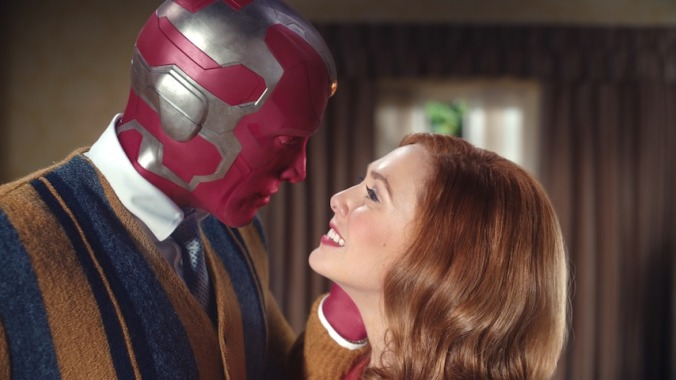TV Rewind: WandaVision Still Remains the MCU’s Most Powerful Project
Photo Courtesy of Disney+
Editor’s Note: Welcome to our TV Rewind column! The Paste writers are diving into the streaming catalogue to discuss some of our favorite classic series as well as great shows we’re watching for the first time. Come relive your TV past with us, or discover what should be your next binge watch below:

Imagine it. You’re stuck at home every day, forced to live again and again through the same endless routine. The world outside is gray, devoid of color. All you want to do is escape, but that’s just not possible, and even attempting to do so can put your life at risk.
This was the reality in Westview, a town Wanda Maximoff transformed using nothing but grief and a touch of chaos magic after Vision’s death in Avengers: Infinity War during her breakout Disney+ series WandaVision. But this was also the reality countless people faced in the real world too, back when WandaVision arrived during one of those early COVID outbreaks in January 2021.
Just as the residents of Westview suddenly found themselves trapped in a nightmare of the Scarlet Witch’s making, we too had our lives upended in a flash with untold suffering as disease claimed the world. You’d think that watching our own experiences reflected back at us would have been painful or hard to watch—because yes, that was absolutely the case for most COVID-set stories that followed—but WandaVision was different.
Marvel’s first show was special, and not just because it was the first or because it was the best—a fact which remains true even now, three and a half years later. WandaVision was bold and daring in ways the MCU had never attempted before.
The weekly release format lent itself extremely well to Wanda’s channel-hopping journey across various eras of TV, which inspired the kind of visual innovation only seen otherwise in Doctor Strange movies. But more than that, this story of a reality-bending witch and her android husband was also more human than anything Marvel had ever depicted on screen.
Every Friday morning, I would wake up still buzzing from Drag Race UK the night before, ready to devour each all-too-short episode of WandaVision with a cup of tea in one hand and my notes app ready in the other. I did it for work, the note-taking, and I would jump into writing one or more pieces on the show as soon as the credits rolled (checking for a post-credits scene each time, of course). But watching WandaVision was never a chore.
Along with It’s A Sin and Season 2 of Drag Race UK, WandaVision helped make that hellish month bearable, if rather sad still at points. Because January isn’t fun at the best of times in Europe, what with all the endless rain and damp. Throw another lockdown into the mix and even the horrors of Westview seem preferable, witches and all. Watching Wanda navigate a hell of her own making helped pull us out of our own, even if just for 30 minutes each week. Grieving for those we had lost while trapped in our lockdown bubble, whether it was because of distance or something infinitely more painful, we could relate to Wanda’s grief too, despite her villainous streak.
Loss defined that time in so many ways, and it’s how Wanda’s story has long been defined on screen as well. WandaVision’s penultimate episode showcased the magnitude of loss the Scarlet Witch has suffered, all leading her to create this trauma-defying bubble. Everything Wanda’s ever held dear had been cruelly snatched away, from her parents and her brother to her free will at the hands of Hydra. That’s a lot for any human to bear, even a superhuman.
As Wanda continued to fight for something better in the wake of all that sorrow, Vision glided into her life with compassion, carrying understanding and seven particular words that would ultimately transcend WandaVision and the broader MCU with its touching poignancy.
-

-

-

-

-

-

-

-

-

-

-

-

-

-

-

-

-

-

-

-

-

-

-

-

-

-

-

-

-

-

-

-

-

-

-

-

-

-

-

-








































